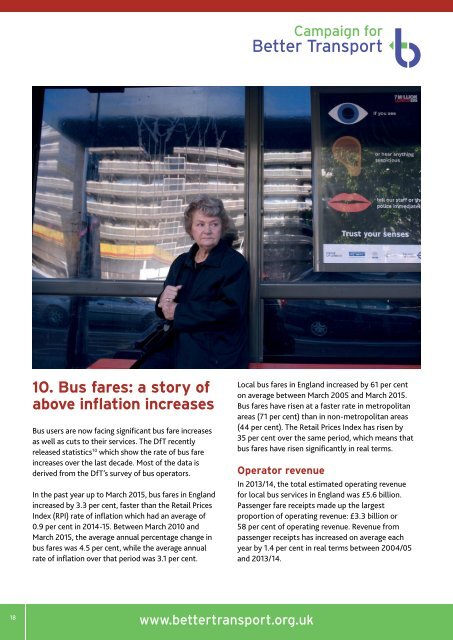You also want an ePaper? Increase the reach of your titles
YUMPU automatically turns print PDFs into web optimized ePapers that Google loves.
Operat<strong>in</strong>g revenue from concessionary fare<br />
reimbursement has more than doubled over the<br />
same period from £500 million to over £1 billion.<br />
This <strong>in</strong>crease reflects the wider coverage of the<br />
concessionary travel scheme (mov<strong>in</strong>g from a local<br />
authority to a national scheme), <strong>in</strong>creased eligibility<br />
and a larger proportion of elderly people <strong>in</strong> the<br />
wider population.<br />
Why bus fares matter<br />
Bus cuts and ris<strong>in</strong>g fares are not simply matters of<br />
<strong>in</strong>convenience. For many people without access to a<br />
car, buses are the only way they can travel to health<br />
services, colleges and places of work. Poor bus provision<br />
and high fares magnifies social problems, obstructs<br />
the delivery of other public services and holds back<br />
economic recovery.<br />
People from low <strong>in</strong>come families are most likely to<br />
rely on buses to get around. They spend a higher<br />
proportion of their <strong>in</strong>come on bus travel and struggle<br />
to access the best fare deals. Statistically low <strong>in</strong>come<br />
10. Bus fares: a story of<br />
above <strong>in</strong>flation <strong>in</strong>creases<br />
Bus users are now fac<strong>in</strong>g significant bus fare <strong>in</strong>creases<br />
as well as cuts to their services. The DfT recently<br />
released statistics 10 which show the rate of bus fare<br />
<strong>in</strong>creases over the last decade. Most of the data is<br />
derived from the DfT’s survey of bus operators.<br />
In the past year up to March 2015, bus fares <strong>in</strong> England<br />
<strong>in</strong>creased by 3.3 per cent, faster than the Retail Prices<br />
Index (RPI) rate of <strong>in</strong>flation which had an average of<br />
0.9 per cent <strong>in</strong> 2014-15. Between March 2010 and<br />
March 2015, the average annual percentage change <strong>in</strong><br />
bus fares was 4.5 per cent, while the average annual<br />
rate of <strong>in</strong>flation over that period was 3.1 per cent.<br />
Local bus fares <strong>in</strong> England <strong>in</strong>creased by 61 per cent<br />
on average between March 2005 and March 2015.<br />
Bus fares have risen at a faster rate <strong>in</strong> metropolitan<br />
areas (71 per cent) than <strong>in</strong> non-metropolitan areas<br />
(44 per cent). The Retail Prices Index has risen by<br />
35 per cent over the same period, which means that<br />
bus fares have risen significantly <strong>in</strong> real terms.<br />
Operator revenue<br />
In 2013/14, the total estimated operat<strong>in</strong>g revenue<br />
for local bus services <strong>in</strong> England was £5.6 billion.<br />
Passenger fare receipts made up the largest<br />
proportion of operat<strong>in</strong>g revenue: £3.3 billion or<br />
58 per cent of operat<strong>in</strong>g revenue. Revenue from<br />
passenger receipts has <strong>in</strong>creased on average each<br />
year by 1.4 per cent <strong>in</strong> real terms between 2004/05<br />
and 2013/14.<br />
families are less likely to have a car. Some children<br />
from poor families are put at further disadvantage<br />
because their parents cannot afford bus fares to get<br />
them to colleges and services. Children from low<br />
<strong>in</strong>come families are at risk of poverty if affordable<br />
transport is not available.<br />
Fare <strong>in</strong>creases and bus cuts are undoubtedly hitt<strong>in</strong>g<br />
some of the poorest families <strong>in</strong> the country hardest<br />
and the <strong>Buses</strong> Bill provides an opportunity to<br />
<strong>in</strong>troduce simplified and affordable ‘Oyster style’<br />
smart ticket<strong>in</strong>g. Oyster is equipped with daily price<br />
capp<strong>in</strong>g which automatically calculates the cheapest<br />
fare for all the journeys made <strong>in</strong> a day. There is no<br />
large upfront charge (just £5 deposit) and passengers<br />
are able to pay‐as‐they‐go, topp<strong>in</strong>g up their card with<br />
whatever they can afford.<br />
18<br />
19<br />
www.bettertransport.org.uk www.bettertransport.org.uk


